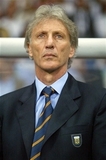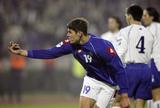 With two European heavyweights and an African outfit blocking their
route to the second round, it is a case of 2002 revisited for
Argentina. However, Albiceleste coach Jose Pekerman is confident of avoiding a repeat of the Asian debacle and has every faith in his squad, saying: "When the going gets tough we always produce the goods."
With two European heavyweights and an African outfit blocking their
route to the second round, it is a case of 2002 revisited for
Argentina. However, Albiceleste coach Jose Pekerman is confident of avoiding a repeat of the Asian debacle and has every faith in his squad, saying: "When the going gets tough we always produce the goods."
When Brazilian legend Pele drew the Netherlands' name out of the hat at the 2006 FIFA World Cup™ Final Draw, a loud murmur went around the Messe Convention Centre. As the mercury plummeted on a chilly December night in Leipzig, Group C was shaping up nicely as one of the tournament's hot spots: Argentina, still smarting from their early exit at Korea/Japan 2002, had been drawn to face Marco van Basten's Oranje in one of international football's classic match-ups. As luck would have it, two more big hitters later joined the Group C party, Côte d'Ivoire and Serbia and Montenegro.
For over 30 million Argentines, memories of Marcelo Bielsa and his despondent charges crashing out in 2002 after completing their group games against Nigeria, England and Sweden remain all too vivid. So just how difficult is the task facing the South American giants this time round? Read on as FIFAworldcup.com delves into the history books and analyses the task facing the two-time world champions in what many see as the tightest of the eight groups.
Out of Africa
Argentina's latest FIFA World Cup adventure gets under way against Côte d'Ivoire in Hamburg on 10 June. Although Henri Michel's team are making their debut on the world stage, the
Albiceleste know exactly what to expect: in three of the last four FIFA World Cups, Argentina have faced an African side in the group phase.
And although the first of these three encounters produced a nasty surprise when Cameroon upset Carlos Bilardo's world champions in the opening game at Italia 90, their overall record is good with the Argentines recovering from that setback to defeat Nigeria at USA 94 and again at Korea/Japan 2002. Standing in their way now are Didier Drogba et al. The South Americans have met the Elephants only once before, compiling a 4-0 victory at the 1992 King Fahd Cup – the forerunner to the FIFA Confederations Cup.
"Côte d'Ivoire are having a great run at the moment. They knocked out Cameroon, the African side with most World Cup experience, and have a strong squad that doesn't just revolve around Drogba," was Pekerman's assessment. The coach, who is recovering from an operation on his right hand, has identified a chink in the African side's armour, which he hopes to exploit when the two meet. "Like all African sides they have defensive lapses and that's where we can make the difference," he said.

Serbia and Montenegro, defensive solidity
On paper, Argentina's second game in Gelsenkirchen on 16 June has all the makings of a clash of styles as Pekerman's side, the second highest scorers in the South American qualifying group (29 goals), go head to head with Serbia and Montenegro, the team with the tightest defence in European qualifying after conceding a solitary goal. There is more to the Balkan side than a miserly back four, however, as Pekerman is only too aware. "Every country has their own style and the Serbs have picked up the baton left by Yugoslavia, who always played good football," he said. "They're a tactically astute and industrious counterattacking team with a lot of experienced players."
But Pekerman remains confident of Argentina's chances. "Our forwards are different to the ones they faced in their qualification group. Our players have more pace and are not as static," he said. Argentina also have history on their side: the only FIFA World Cup meeting between the former Yugoslavia and Argentina came in the quarter-finals at Italia 90, when the South Americans prevailed on penalties.
The Netherlands, an old adversary
The most eagerly anticipated of the group clashes sees Argentina take on the Dutch in Frankfurt on 21 June, the latest in a series of classic encounters between two of planet football's heavyweights. The Netherlands, with Van Basten at the helm, have the edge over the Albiceleste in previous meetings, beating them in the 1974 and 1998 finals. Nonetheless, it was the Argentinians who emerged triumphant in the most important meeting of the two: the 1978 final in Buenos Aires, a night made memorable by Mario Kempes' joyous goals and celebrations.
There is a possibility, of course, that the two giants will have already qualified by the time they square off. To do so they will have to win their first two games, by no means an easy task. Pekerman, who has just started giving interviews again, is bullish about his team's prospects: "Holland have got some great players, that's true, but you need a lot more than big names to build a good side.
"We'll just have to see how they react to games as important as these." As he rounded off his analysis, a smile spread across his face. "We know that when the going gets tough, we always produce the goods." He has three games to fulfil that promise.